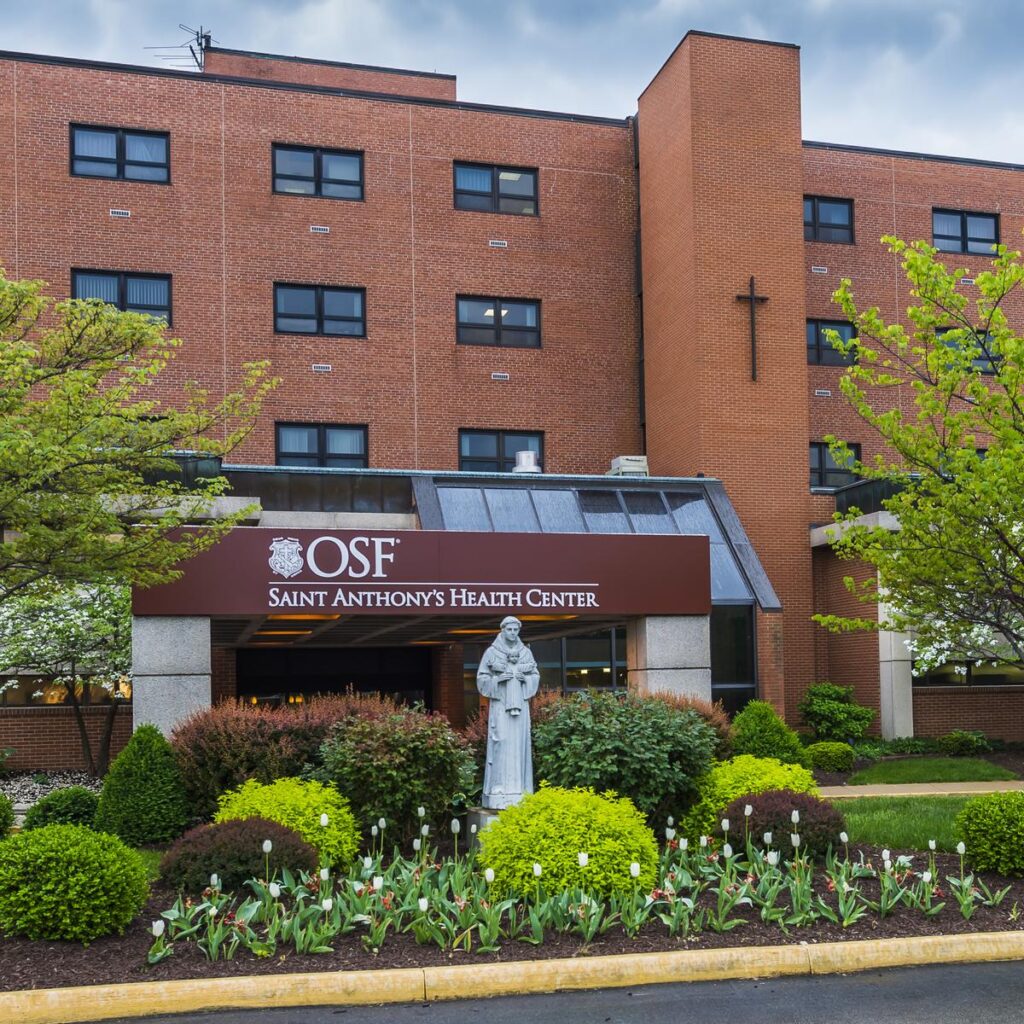
ALTON – OSF Saint Anthony’s Health Center has earned The Joint Commission’s Gold Seal of Approval® and the American Heart Association/American Stroke Association Heart-Check mark for Primary Stroke Center Advanced Certification.
OSF Saint Anthony’s underwent a rigorous, unannounced onsite review on December 4, 2023. During the visit, a team of Joint Commission reviewers evaluated compliance with related certification standards including program management, supporting self-management, and delivering and facilitating clinical care. Joint Commission standards are developed in consultation with healthcare experts and providers, measurement experts, and patients. The reviewers also conducted onsite observations and interviews.
“OSF Saint Anthony’s Primary Stroke Center Advanced Certification recognizes healthcare organizations committed to striving for excellence and fostering continuous improvement in patient safety and quality of care,” says Ken Grubbs, DNP, MBA, RN, executive vice president of Accreditation and Certification Operations and chief nursing officer, The Joint Commission. “We commend OSF Saint Anthony’s for using The Joint Commission certification process to reduce variation in clinical processes and to strengthen its clinical program to drive safer, higher quality, and more compassionate care for individuals served.”
“We congratulate OSF Saint Anthony’s Health Center in Alton for this outstanding achievement,” says Nancy Brown, chief executive officer, of the American Heart Association. “This certification reflects its commitment to providing the highest quality of care for stroke patients.”
“OSF Saint Anthony’s is committed to improving patient care by adhering to the latest treatment guidelines,” says Jerry Rumph, MHA, FACHE, president, of OSF Saint Anthony’s Health Center. “Receiving Primary Stroke Center Advanced Certification from The Joint Commission means we’re making exceptional efforts to foster better outcomes. It’s a signal to the Riverbend region that the quality-of-care OSF Saint Anthony’s provides meets the unique and specialized needs of stroke patients.”
This is the second stroke recognition and/or certification that OSF Saint Anthony’s has received in the last eight (8) months. Back in July 2023, OSF Saint Anthony’s also received the American Heart Association’s Target: StrokeSM Honor Rollaward. To qualify for that recognition, hospitals must meet specific criteria that reduce the time between an eligible patient’s arrival at the hospital and treatment with the clot-buster alteplase.
Additionally, OSF Saint Anthony’s also received the American Heart Association’s Target: Type 2 Honor Roll award in July 2023. Target: Type 2 Diabetes aims to ensure patients with Type 2 diabetes, who might be at higher risk for complications, receive the most up-to-date, evidence-based care when hospitalized due to stroke.
Stroke kills nearly 150,000 of the 860,000 Americans who die of cardiovascular disease each year—that’s 1 in every 19 deaths from all causes.
“If you or a loved one has ever had a stroke, you may be familiar with the phrase time is the brain—meaning time is of the essence when treating a stroke,” says Dennis Sands, MD, chief medical officer, OSF Saint Anthony’s Health Center. “With each moment that a stroke goes untreated, the nervous tissue in the brain is rapidly and irreversibly damaged.”
This is disturbing because about 80% of strokes are preventable. You can greatly reduce your risk for stroke by making lifestyle changes to help control your blood pressure and cholesterol levels and, in some cases, by taking medication.
An easy way to remember the most common signs of stroke and how to respond is with the acronym F.A.S.T.:
- B = Balance: Ask the person if they’re having sudden difficulty with balance.
- E = Eyes: Ask the person if they’re experiencing vision problems in one or both eyes.
- F = Face drooping: Ask the person to smile. Does one side droop?
- A = Arm weakness: Ask the person to raise both arms. Does one arm drift downward?
- S = Speech difficulty: Ask the person to repeat a simple sentence. Are the words slurred?
- T = Time to call 9-1-1: If the person shows any of these signs, call 9-1-1 immediately.
Other common signs of stroke are:
- Sudden dizziness, trouble walking, or loss of balance or coordination
- Sudden trouble seeing in one or both eyes
- Sudden severe headache with no known cause
- Sudden numbness of the face, arm, or leg
- Sudden confusion or trouble understanding others
If you think that you or someone you know is having a stroke, call 9-1-1 immediately. Stroke is a medical emergency, and stroke treatment and outcomes depend on how fast you get to the hospital and the type of stroke you had. When you are transported by ambulance, first responders may be able to start your treatment right away and can alert the hospital that a stroke patient is on the way.
This notification gives the hospital’s medical team time to prepare equipment and medicines you may need.
High blood pressure is the single most important treatable risk factor for stroke. Preventing, diagnosing, and controlling it through lifestyle changes and medicine are critical to reducing stroke risks.
Anyone, including children, can have a stroke at any time. Every year, about 800,000 people in the United States have a stroke—and about 1 out of 4 of those strokes are recurrent strokes. “Having one stroke means you have a greater risk of having another (or recurrent) stroke,” says Dr. Sands.
Several factors that are beyond your control can increase your risk for stroke. These include your age, sex, and ethnicity. But there are many unhealthy habits, such as smoking, drinking too much alcohol, and not getting enough exercise, that you can change to lower your stroke risk. Using tobacco products and having high blood pressure, high cholesterol, diabetes, or obesity can also increase your risk for stroke.
However, treating these conditions can reduce your risk. Ask your doctor about preventing or treating these medical conditions.
For more information on The Joint Commission, please visit www.jointcommission.org.

